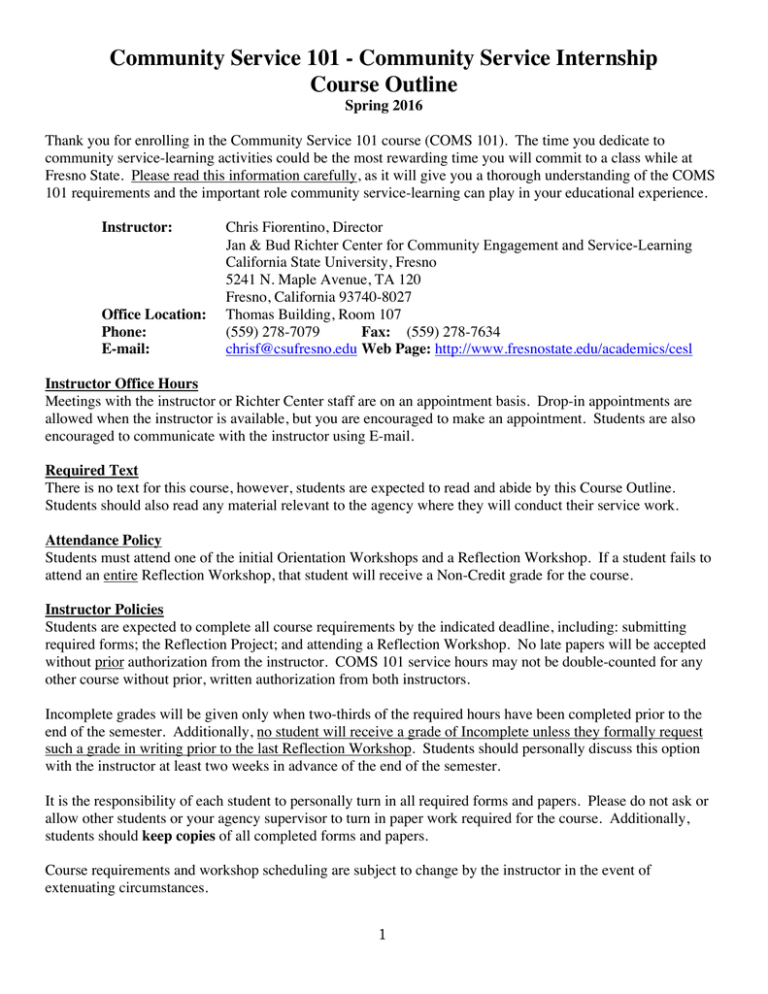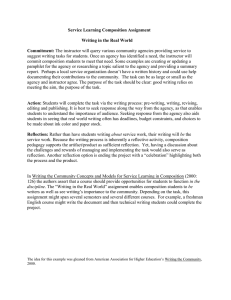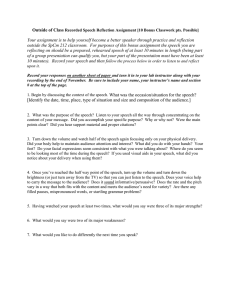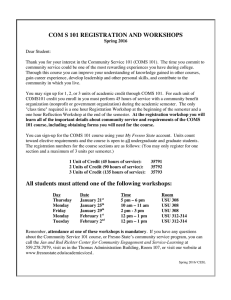Community Service 101 - Community Service Internship Course Outline
advertisement

Community Service 101 - Community Service Internship Course Outline Spring 2016 Thank you for enrolling in the Community Service 101 course (COMS 101). The time you dedicate to community service-learning activities could be the most rewarding time you will commit to a class while at Fresno State. Please read this information carefully, as it will give you a thorough understanding of the COMS 101 requirements and the important role community service-learning can play in your educational experience. Instructor: Office Location: Phone: E-mail: Chris Fiorentino, Director Jan & Bud Richter Center for Community Engagement and Service-Learning California State University, Fresno 5241 N. Maple Avenue, TA 120 Fresno, California 93740-8027 Thomas Building, Room 107 (559) 278-7079 Fax: (559) 278-7634 chrisf@csufresno.edu Web Page: http://www.fresnostate.edu/academics/cesl Instructor Office Hours Meetings with the instructor or Richter Center staff are on an appointment basis. Drop-in appointments are allowed when the instructor is available, but you are encouraged to make an appointment. Students are also encouraged to communicate with the instructor using E-mail. Required Text There is no text for this course, however, students are expected to read and abide by this Course Outline. Students should also read any material relevant to the agency where they will conduct their service work. Attendance Policy Students must attend one of the initial Orientation Workshops and a Reflection Workshop. If a student fails to attend an entire Reflection Workshop, that student will receive a Non-Credit grade for the course. Instructor Policies Students are expected to complete all course requirements by the indicated deadline, including: submitting required forms; the Reflection Project; and attending a Reflection Workshop. No late papers will be accepted without prior authorization from the instructor. COMS 101 service hours may not be double-counted for any other course without prior, written authorization from both instructors. Incomplete grades will be given only when two-thirds of the required hours have been completed prior to the end of the semester. Additionally, no student will receive a grade of Incomplete unless they formally request such a grade in writing prior to the last Reflection Workshop. Students should personally discuss this option with the instructor at least two weeks in advance of the end of the semester. It is the responsibility of each student to personally turn in all required forms and papers. Please do not ask or allow other students or your agency supervisor to turn in paper work required for the course. Additionally, students should keep copies of all completed forms and papers. Course requirements and workshop scheduling are subject to change by the instructor in the event of extenuating circumstances. 1 Mission and Philosophy of the Richter Center and Purpose of COMS 101 Course The Richter Center is dedicated to improving the education and development of our students and helping create a better community through service and learning. The COMS 101 course is just one of the many initiatives sponsored by the Richter Center. Our efforts are based on the belief that, as part of a complete educational experience, community service-learning fosters a student’s academic, personal and career development, and strengthens a commitment to community involvement. The Richter Center is committed to fostering a life-long service and civic ethic in our students, which will stimulate and enhance their educational experience. Course Objectives - What You Can Expect To Gain Community service-learning provides a variety of benefits to the students and the community. It is very common that students get much more out of their service experience than they expect. Also, the community gains resources and services that would otherwise be unavailable. It is the objective of this course that students will: 1) Apply their skills and knowledge to societal problems, thereby providing meaningful service. 2) Develop personally, professionally and academically through their service experience. 3) Gain a greater understanding of themselves, societal needs, and their role in the community. Research shows that service has a unique way of developing an individual's leadership skills, sense of community, civic ethic, self-esteem, and other personal characteristics. In terms of career growth, service activities provide students with the opportunity to explore careers, experience their chosen career field, develop professional skills and contacts, build their resume, and put into practice the information they have learned in academic settings. Research further shows that learning (as measured by G.P.A., retention and graduation rates) improves when students engage in service. Every service activity benefits a specific individual or group. Whether its building homes for the poor, serving victims of chronic or terminal illness, tutoring children, addressing environmental needs or any other service, there is a person or group who ultimately benefits from your time. Without volunteers like you, these services would not be provided and the lives of those people receiving the services would not be as enriched. Finally, the organization where you conduct your service benefits enormously. Community benefit agencies (nonprofits) and government programs have significant limits on their financial and personnel resources, yet client needs continue to expand. Volunteers can make important contributions to these agencies in their attempt to deal with the complex and growing needs of society. So, when you volunteer, the benefits positively impact you, the agency where you serve and the individuals served by that agency. This is a win-win-win scenario! University Policies Students with Disabilities: Upon identifying themselves to the instructor and the university, students with disabilities will receive reasonable accommodation for learning and evaluation. For more information, contact Services to Students with Disabilities in the Henry Madden Library, Room 1202 (278-2811). Honor Code: Members of the CSU Fresno academic community adhere to principles of academic integrity and mutual respect while engaged in university work and related activities. You should: a) Understand or seek clarification about expectations for academic integrity in this course (including no cheating, plagiarism and inappropriate collaboration). b) Neither give nor receive unauthorized aid on any course work that is used by the instructor as the basis of grading. c) Take responsibility to monitor academic dishonesty in any form and to report it to the instructor or other appropriate official for action. 2 Cheating and Plagiarism: Cheating is the actual or attempted practice of fraudulent or deceptive acts for the purpose of improving one's grade or obtaining course credit; such acts also include assisting another student to do so. It is the intent of this definition that the term 'cheating' not be limited to examination situations only, but that it includes falsifying agreement or verification forms. Plagiarism is a specific form of cheating, which consists of the misuse of the published and/or unpublished works of others by misrepresenting the material as one's own work. The instructor has a zero tolerance for cheating and plagiarism. Anyone caught cheating or plagiarizing will receive a Non-credit for the course, be referred to the Dean of Student Affairs for disciplinary action, and may be expelled from the university. For more information on the University's policy regarding cheating and plagiarism, refer to the Class Schedule or University Catalog. Computers: At Fresno State, computers and communications links to remote resources are recognized as being integral to the education experience. Every student is required to have his/her own computer or have other access to a workstation (including a modem and a printer) with all the recommended software. Students should check their Fresno State email regularly and respond promptly as needed. The instructor uses email as the major form of communication with students in the COMS 101 course. Community Service 101 Requirements This course is open to all Fresno State students. Students may only enroll in a maximum of 3 units per semester. Up to six units of COMS 101 can be used as elective credits towards graduation. (Please note: although only six units can apply towards graduation, all units earned will be reflected on your transcripts.) For each unit of COMS 101 credit, a minimum of 45 hours of community service must be performed. 1 unit of credit requires a minimum of 45 hours of service. 2 units of credit require a minimum of 90 hours of service. 3 units of credit require a minimum of 135 hours of service. Students will only be graded for the number of units they enroll in and the subsequent requirements of that section. Students may not earn and will not be graded for a different number of units than which they are officially enrolled in for the course, regardless of how many hours they complete. Please note that COMS 101 credits do not count towards any major or internship requirements, or independent study credits in other departments, without the prior consent of the appropriate department personnel. You may not count service hours for other courses towards the requirements of this course, or vice-versa. MINIMUM COURSE REQUIREMENTS COMS 101 students are graded on a Credit/Non-Credit basis. In order to receive credit, a student must: ◆ Fulfill and verify that you completed the appropriate number of service hours listed above. (Use the COMS 101 Student Tracking and Verification Form. One form per service site. Only a person in an official capacity with the agency may sign this form. A signature from a relative or friend is not allowed.) ◆ Complete a Reflection Paper on your service experience. (See Page 6 of this outline.) ◆ Attend a semester end "Reflection Workshop". (See Page 5-6 of this outline.) These requirements must be completed by the end of the last Reflection Workshop. This is not the same as the last day of finals! If you do not fully complete all of the above requirements by the appropriate deadline you will receive a Non-Credit grade for the course. 3 Course Deadlines There are deadlines you must follow in order to receive credit for the course. These deadlines include: ◆ Attend a Com S 101 orientation workshop during the first two to three weeks of the semester. ◆ Submit your completed Community Service 101 Agreement Form* to the Richter Center no later than the end of the fourth week of the semester, or at the outset of your service, whichever comes first. ◆ Complete the required hours, submit your signed Student Tracking and Verification Form*, complete your "Reflection Paper", attend a "Reflection Workshop" and submit the appropriate papers by the last scheduled workshop. (See pages 5 and 6 for details on the Reflection Workshops and Reflection Paper.) *Only individuals in an official capacity with the organization where you serve should sign COMS 101 forms. Immediate family relatives, friends or other students are not allowed to sign these forms. Finding a Volunteer Service Position Start contacting potential agencies right away, as it may take several weeks to arrange your service assignment and begin your hours! There are virtually no limits to the types of service positions available. If you work as a volunteer (unpaid), your activities are community service oriented, and the agency you serve is a community benefit organization (CBO) or government entity, you may count the hours towards this course. You are encouraged to select a community service assignment that will provide you with the best experience possible. You are encouraged to "shop around" for the best service opportunity. While you may serve at more than one location, at least 70% of your service hours should be completed with a single organization. A searchable, internet database is available to help you identify local service opportunities. This database is constantly updated, growing. The database can be accessed at http://www.handsoncentralcal.org/. The Richter Center staff can provide personal guidance in selecting a volunteer position. Contact the Richter Center at 559.278.7079 or visit us in the Thomas Building, Room 107 for assistance. Remember that there are literally hundreds of volunteer service opportunities available to you. From Anthropology to Zoology, there are service opportunities that meet your academic and career interests. Please note that there are a few types of service activities that are not eligible for Community Service 101 credit. While we do not discourage students from being involved in these types of activities, you may not use these types of service to earn COMS 101 credits. These include, but are not limited to: ◆ Paid work of any kind; ◆ Volunteer or paid work for a private, for-profit company; ◆ Work for any private individual or family when not working in direct cooperation with and under the supervision of a community benefit agency; ◆ Work for a political candidate or campaign. You may volunteer for an elected official, but you may not count hours served towards any individual’s campaign or election effort; ◆ Work for a Church or religious organization that includes evangelizing or proselytizing. (Completing your service work with a religious organization is allowed, however, that service cannot include the above activities.) You may not count volunteer hours conducted prior to the current semester for COMS 101, unless you have made previous and specific arrangements with the course instructor. You may not double-count COMS 101 hours for any other course, or vice-versa, without prior, written consent of both instructors. 4 Capitalizing On Your Service Opportunity Community service-learning provides a great opportunity to enhance your educational, personal, and professional development. Like any opportunity it is up to you to make the most of this experience. It is up to you to choose the service site that best matches your goals and interests. The following are guides that can help you find and complete a service activity that will provide you with the most meaningful experience possible. • Explore different opportunities before choosing a service site. With over 700 community benefit agencies in Fresno alone, your options are incredibly diverse. Don’t be afraid to try something new – but start investigating opportunities now! • Find a service opportunity that relates to your academic major and/or career goal. This is a great opportunity to understand how the theories you learn in classes apply to problems in the community. It is also an excellent opportunity to explore careers, build your resume, and develop your network of contacts. • Look for a service opportunity that addresses an issue that you care about. Are you concerned about the environment, at-risk youth, crime/violence, the elderly, the poor, disadvantaged communities, education, health or any other societal issues? Use your service hours as a way to become involved in an issue that interests you. Making it personal will make it meaningful! • Treat this opportunity like you would an important job. Your responsibilities to the agency and the people served make this an extremely important commitment. Being a volunteer does not decrease your obligations. Dress professionally, be on time, perform your work to the best of your abilities and abide by all agency rules and regulations. If you perform your work poorly it will negatively reflect on you, the university and the Richter Center. If you do well in your volunteer duties, it may be a springboard to future opportunities, including references, job referrals, part-time work or full-time career opportunities. • Regularly discuss your volunteer work assignment(s) with your supervisor. If you wish to be involved in specific activities at your agency, ask to do so. If your service work is not what you envisioned, talk to your supervisor about your concerns. Many times they will be willing to involve you in new projects if they know you are interested. Reflection Workshop You are required to attend one entire Reflection Workshop during the final weeks of the semester. A discussion regarding students’ experiences and comments by the course instructor will take place. Attendance at one of these Workshops is a major requirement for COMS 101 credit! There are no exceptions. The following is a list of the dates and times that these workshops will be held. A variety of days and times are provided to accommodate all class members. Please make plans now to attend one of these workshops so that work or other obligations will not interfere. You must attend the entire workshop. A significant alternative assignment may be required, if approved by instructor in advance. COMS 101 REFLECTION WORKSHOP SCHEDULE – Spring 2016 Wednesday Thursday Friday Monday Monday May 11th May 12th May 13th May 16th May 16th 5pm – 6pm 2pm – 3pm 10am – 11am 10am – 11am 3pm – 4pm USU 309 USU 309 USU 309 USU 312-314 USU 312-314 (USU = University Student Union Building) Students are encouraged to turn in Reflection Papers (see below) during the Reflection Workshop that they attend, but they may be turned in at other times prior to the May 16th, 4pm deadline. 5 Reflection Paper In order to help you maximize your learning experience, you are required to complete a Reflection Paper. There are different requirements regarding the length of the Reflection Paper, depending on the number of units of Community Service 101 you enroll in: ◆ Students in the 1 unit section must write a 700 word minimum paper (about 3 pages). ◆ Students in the 2 unit section must write a 1,000 word minimum paper (about 4 pages). ◆ Students in the 3 unit section must write a 1,400 word minimum paper (about 5 pages). This paper provides an opportunity to reflect on all the aspects, positive and negative, of your community service. Write about your personal and even emotional reaction to your service experience. Specifically section your paper to address the following questions: Section 1: Briefly describe where you served and what service(s) you provided as you completed your hours. Section 2: List one or two of the skills or abilities you used in your service activities. Did you develop any new skills or enhance any existing skills? If so, please describe those skills. If not, why do you feel you did not develop or enhance any skills. In preparing your answer, consider skills like leadership abilities, communication skills, confidence, diversity awareness, time management, empathy, patience or others. Section 3: Did you learn anything about yourself, a specific issue in the community, or about the people and/or issues that confront our community? If so, please describe one or two specifics. Section 4: Was your service beneficial to you professionally? For example, did your service help you to explore a career, experience your career field, develop professional skills and contacts, or build your resume? Section 5: Do you believe you benefited academically in some way through this service experience? For example, where you able to put knowledge learned in other classes to use in performing your service? Do you believe this experience enhanced your understanding of material covered in other classes? Section 6: Optional/Open Section, as needed to reach the page/word limit: In this section you are free to talk about any challenges, benefits, or impacts resulting from your service experience. What impact do you think you had on those served? How has this service changed you? Will it impact your future volunteering, voting or other behavior? What would you change about your experience if you could? Papers must be typed and written in a way that they are worthy of credit in a college-level course. Doublespaced, 12 pt. font is recommended. Please indicate the word count at the end of the paper. If your paper is too short or poorly written, you will not receive credit for the paper or the course. *Feedback Letter: Agency representatives have repeatedly told us that feedback from volunteers is very helpful. These letters are used by agencies for program development, grants, volunteer recruitment and more. All students are encouraged to send a formal feedback/thank you letter to their supervisor. This letter may be used as a substitute for one page of the required Reflection Project. In writing this letter, consider what you would want to hear from volunteers who worked for you. If you have suggestions for change, word them in a constructive and positive fashion. This letter should be written in the most professional manner possible. A copy must be included with your Reflection Paper if you want it to count towards your Paper requirements. The deadline for all requirements is Monday, May16th, 2016 at 4 pm (last spring 2016 Reflection Workshop). CESL: 12/23/16 6


